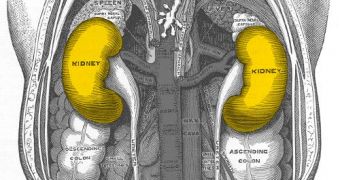A new long-duration study has determined that people who donate one of their kidneys to others are just as likely to live normal lives as people who still have both their organs. The research followed some 80,000 live kidney donors in the United States for a period of up to 15 years, and determined that, if the donors survive the initial, somewhat risky period, then they are very likely to live normal lives afterwards. This is the first investigation to look at this issue at a national level, rather than at the level of single institutions that deal with this type of operations, LiveScience reports.
“Whatever happens when people donate kidneys, on average, it doesn't affect the rest of their lives – and that has never been shown before in a study of this size and scope,” explains Johns Hopkins University (JHU) School of Medicine transplant surgeon Dr Dorry L. Segev. The expert was also the author of a new paper detailing the findings, which appears in the March 10 issue of the respected scientific Journal of the American Medical Association. Segev is quick to point out that kidney donation is not without risk.
In the first 90 days following a transplant, live donors have a higher mortality rate than people who did not give any of their kidneys away. This is caused by possible complications, and other issues that may arise as their bodies become accustomed to functioning with only one kidney. In addition, some subgroups of donors have a higher chance of dying in the long-run, but this risk is triggered by conditions that they were suffering off before donating. That is the main reason why performing detailed check-ups of donors before their kidneys are removed is so important. Still, researchers would like to conduct more studies, and learn of the physiological changes to occur in the bodies of donors.
“While there are never any guarantees with surgery, donating a kidney is safer than undergoing almost any other operation,” Segev said in a public statement. The risk of dying in the first 90 days following the surgery was quantified to be about 3.1 individuals per every batch of 10,000 donors, whereas the risk for people who did not donate was determined to be 0.4 individuals for the same batch. At the 12-year mark after the study began, kidney donors were actually outliving those who did not donate, exhibiting a mortality rate of 1.5 percent, as opposed to the others' 2.9 percent.

 14 DAY TRIAL //
14 DAY TRIAL //